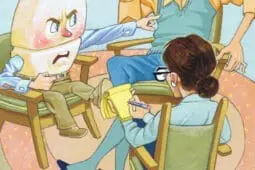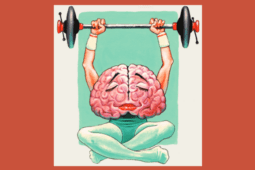Professional Development
The Power of How
Helping Depressed Clients Make Better Choices: An Interview with Michael YapkoOne of the most useful ways of understanding depression is the stress generation model, based on the idea that depressed people need better skills and... Read more
Enduring recovery from obsessive compulsive disorder means riding out the demands of an inner bully. Read more
Rediscovering the Myth
For John O'Donohue, Therapy Is a Journey into the Unknown SelfPoet John O'Donohue's introduction to the therapy field came through his unlikely friendship with neuropsychiatrist Daniel Siegel, known for his book The... Read more
VIDEO: Incorporating Energy Psychology in Your Practice
Getting Clients Comfortable with Energy PsychologyIt’s not within the standard protocol of talk therapy to tap on clients’ acupuncture points as they focus on a problem or goal. Even therapists convinced... Read more
The Power of the Pen in Therapy
Some Journaling Exercises to Enhance Your WorkSome guidelines for bringing the creative power of therapeutic journaling into your work. Read more
The Whole World Is Watching
Therapy and the TED Talk StageEarlier this year, therapist Michele Weiner-Davis spent hours in front of a camera, her husband patiently hitting the record button as she rehearsed for what... Read more
How to Make a Group Practice Work
The Challenge of Becoming the BossI’m finding myself unable to take on more clients due to a full schedule, but I still want to grow my practice and finances. Would starting a group practice... Read more
Beyond Chemistry
Exploring Our Relationship with Our MedsThe chemical effect of psychoactive meds is only part of their impact. In fact, people often develop complex relationships with the pills they take. Read more
The Anatomy of a Psychiatric Consult
Solving the PuzzleFor many therapists, an air of mystery surrounds the role of psychopharmacology in mental health treatment. Here's a step-by-step tour of the complexities of... Read more
The Meds of the Future
Waiting for the Next Magic PillDoes our growing understanding of the brain and the prospect of further scientific discoveries mean there’s a new generation of magical pills on the horizon? Read more
For therapists, giving a TED talk is the new professional milestone. Read more
The Challenge of Becoming the Boss
How to Make a Group Practice WorkMaking a group practice work means taking on the challenge of becoming a boss. Read more
VIDEO: Examining DSM-5's Most Controversial Change
Gary Greenberg on the Bereavement Exclusion“When DSM-III came out and the major depression diagnosis was created,” Gary tells us in this brief video clip, “it was immediately clear that many... Read more
VIDEO: The Increasing Role of Biology in the DSMs of Tomorrow
How Genetics Shape PsychopathologyRather than continuing to lament the deficiencies of DSM-5, forensic psychiatrist David Mays wants to focus on what's ahead for the psychotherapy field. In his... Read more
VIDEO: How to Install New Mental States
What Therapists Should Know about Brain ChangeUntil recently, the impact of brain science on the everyday work of most therapists has been pretty limited. According to Rick Hanson, that’s because we’ve... Read more
Becoming a Supershrink: Three Steps to Professional Excellence
Getting Client Feedback Isn’t Always Easy, But It's a Necessary StepMost therapists, when asked, report checking in routinely for client feedback and knowing when to do so. But research has found this to be far from true. Read more
VIDEO: How to Make Clients Feel Safe
Today's Video: Bringing Polyvagal Theory into Your PracticeHow can therapists acquire neuroscientific knowledge without becoming brain scientists themselves? Even more pressing, what real-life practical therapeutic... Read more
Why DSM-5 Is a Step Forward for Psychotherapy
Find Out About the Benefits of Dimensional DiagnosisIn this video clip, Regier talks about how the new definition of a major depressive disorder in DSM-5 better enables clinicians to diagnose clients who exhibit... Read more
Do Brain Games Build Cognitive Muscle?
Grim Job Prospects for Mental Health GradBrain games and grad prospects Read more
Outside the Box
Bringing Families into Trauma TreatmentIf we don’t open up the one-on-one therapeutic cloister, trauma sufferers may never learn how to engage in the give and take of real-life relationships. By... Read more
When Victims Victimize Others
Some Clients Challenge our Capacity for CompassionMost therapists find it relatively easy to feel empathy for the usual hyperaroused, vulnerable trauma client. But it can be a lot tougher to remain... Read more
VIDEO: What to Do When Therapy Stalls
Bill Doherty on Handling the Issue of Progress Before it's a CrisisBill talks about a proactive approach that can lead to positive developments when therapy starts to stall. Read more
What Really Motivates Resistant Clients
Finding Emotionally Compelling Reasons to ChangePush up against a resistant client, you get more resistance. Try a comforting, helpful approach, and you can undermine a client's motivation to act. So what's... Read more
Move Beyond the Fee-for-Service Therapy Model by Offering Other Types of Psychotherapy Products Read more
Defiance vs. Compliance—Two Faces Of The Reactant Client
John Norcross on Different Approaches that Work with Each ExtremeJohn Norcross gives us a clear and compassionate take on reactance—what it is, how it’s different from resistance, and how to begin with each extreme. Read more
Getting to the Heart of the Stuck Couple’s Story
Peggy Papp on Using Metaphor for New Insight, Fresh Language, and Forward MovementHow can a therapist cut through a couples’ intellectualizations, defensiveness, and ritualized use of language? The key is to bypass the language and explore... Read more
Is Therapy Creative?
Erving Polster on Rethinking the Concept of CreativityErving Polster talks about the concept of creativity how he sees it and how it is applied to the work we do with our clients. Read more
Improving Therapeutic Effectiveness: Moving Beyond Reliable Performance
How Can We Make Progress in Our Therapeutic Effectiveness?K. Anders Ericsson’s work on deliberate practice and client feedback explains studies showing that most of us grow continually in confidence over the course... Read more
The Debate Over DSM-5: A Step in the Right Direction
A Step in the Right Direction: An Interview with Darrel RegierThe vice chair of the DSM-5 Task Force is bemused that the release of what was intended to be a more accurate and rigorously researched manual has raised such... Read more
Editor's Note - March/April 2014
DSM, Psychotherapy's World AlmanacEven though the grumbling about DSM-5 does seem to have reached some kind of tipping point, it isn’t clear at all what alternative would be any better... Read more


























